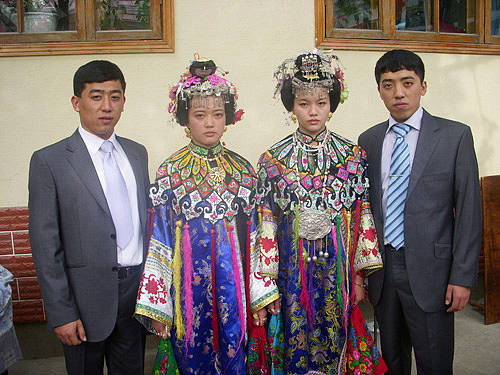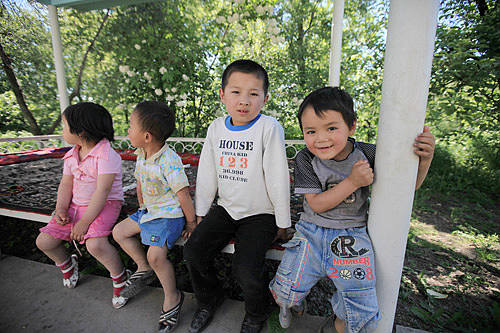|
 |
|
TRADITIONAL WEDDING: Traditional wedding dress worn by Dungan women (COURTESY OF THE ASSOCIATION OF DUNGANS IN KAZAKHSTAN) |
Dungan people believe "more children mean more happiness." Many families have four or more children. In Kazakhstan, a mother with more than six kids is called "Hero Mother." Only in Masanchi and another town Sortobe in Kazakhstan, there are more than 600 hero mothers.
Hardworking
A hundred years ago, Dungan people climbed over Tianshan Mountains and fled to Central Asia, bringing with them farming tools and seeds. Various difficulties they encountered turned them into hardworking people. Upon their arrival in Central Asia, they opened up wasteland and sowed seeds of vegetables such as tomatoes, cucumbers, garlic and scallions. Many of the vegetables were not grown in the region previously.
Today, many Dungans make a living from growing these vegetables and selling them in Kazakhstan's Almaty, or even exporting them to Russia and elsewhere. Statistics show more than half of the vegetables consumed in Kazakhstan are grown by Dungans. The vegetables have enriched local people's dining tables, and increased the Dungans' income.
The average annual household income in Dungan Villages is around $3,000 to $4,000, and each household owns one to two cars or vans, Daurov said. Vehicles are not for showing off, but necessities to work in the fields and for selling vegetables.
 |
|
NEW GENERATION: Dungan children in the backyard of their home in Masanchi town (YANG JIA) |
Since the late 1980s, Dungan Villages in Kazakhstan and China, especially Shaanxi Province, have engaged in economic and cultural exchanges more and more frequently. A greater number of Dungans are doing border trade with China. Daurov has visited China many times, bringing back equipment and technologies. They learned greenhouse-planting skills in China, which enabled Dungans to grow vegetables all year round. In recent years, Dungans have also introduced brick making machinery and equipment to produce biscuits and paint from China.
The Kazakh Government carried out quite favorable policies toward Dungans. In 2002, the government canceled most toll stations along the routes where Dungans transported vegetables to facilitate the vegetable sale of Dungans. After that, the routes were called "green passages" by local people.
Friendly ties
Dungans attach particular importance to culture and education. In Masanchi town, there are four schools with more than 3,000 students. In two of the schools, students learn Dungan language, as well as Kazakh, Russian and English. In addition, the Association of Dungans in Kazakhstan selects 60 to 70 students each year and sends them to study in China's universities such as Northwest University, Xi'an International Studies University and Lanzhou University. Daurov's son is now studying Chinese in Shanghai-based Fudan University.
Although many Dungans have never been to China, they miss the land. To better preserve their traditions and promote trade and cultural exchanges with China, the association plans to set up Chinese classes in Kazakhstan, aiming to make it more convenient to learn Chinese.
The association now has an office in Xi'an, capital of Shaanxi Province, which facilitates exchanges and cooperation with China. In the meantime, the Shaanxi Government sends Chinese teachers to Kazakhstan to help young Dungan people to learn Chinese and sends agricultural experts to teach vegetable growing and crop planting skills.
The Origin of Dungan People
In 1864, during the Taiping Rebellion, Hui people living in northwest China (today's Shaanxi, Gansu and Ningxia) began a large scale rebellion against the Qing government which send troops to quell it. In 1877, about 10,000 rebels migrated westward to escape the troops, crossing over the Tianshan Mountains. Several thousand people died on the road, but 3,000 eventually arrived in Central Asia, where they settled down in the border region of the Russia Empire. They were called Dungans (people from the east) by the Tsarist government. | 